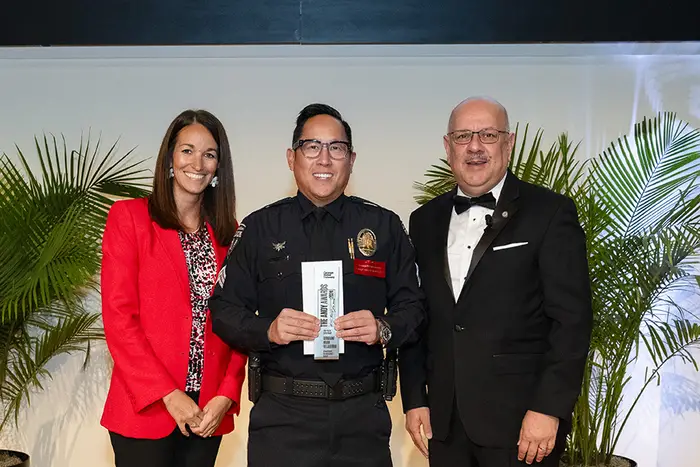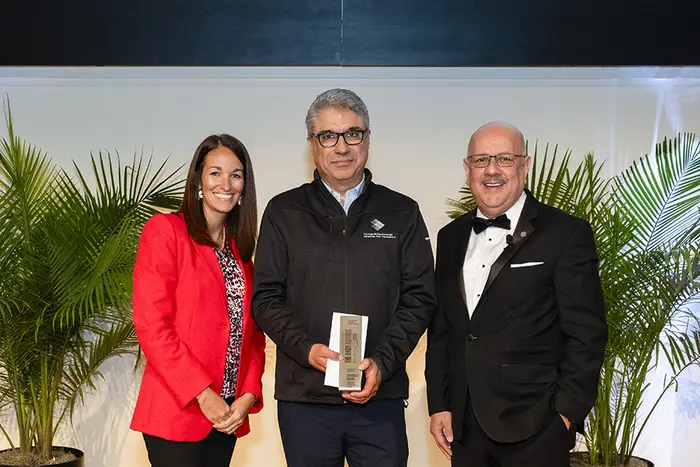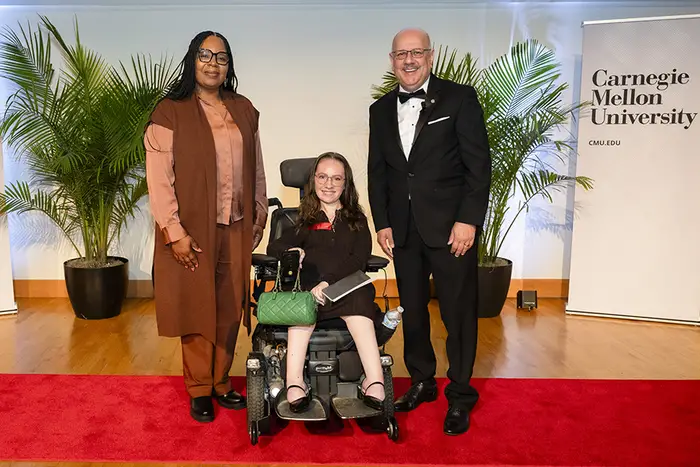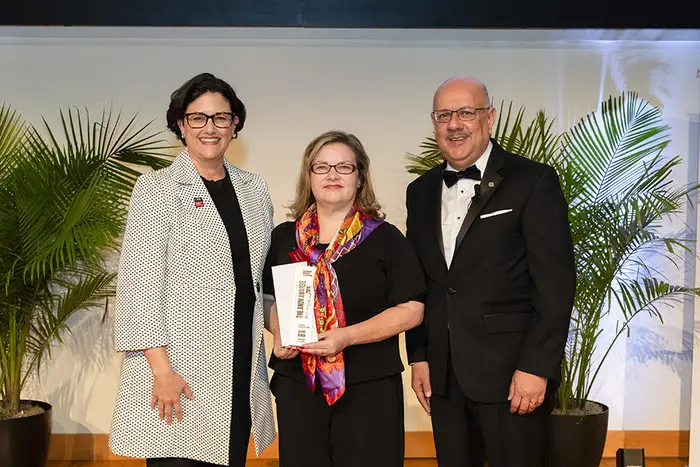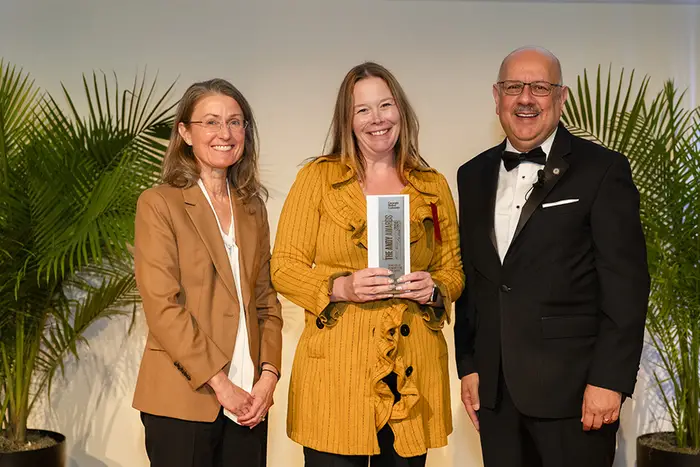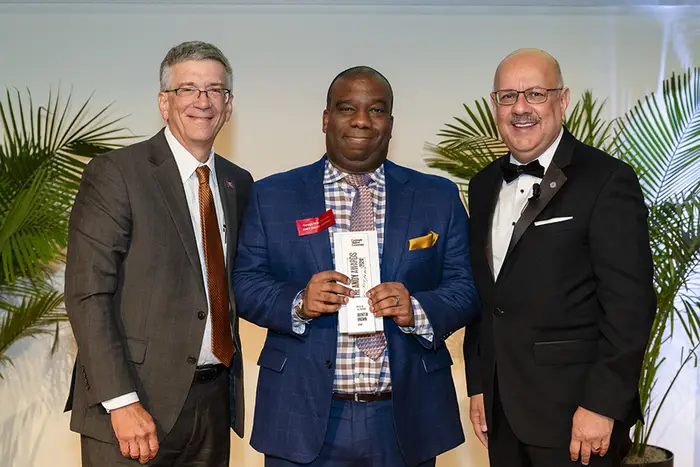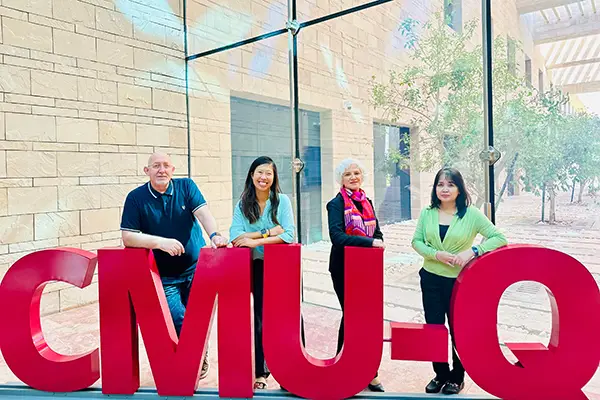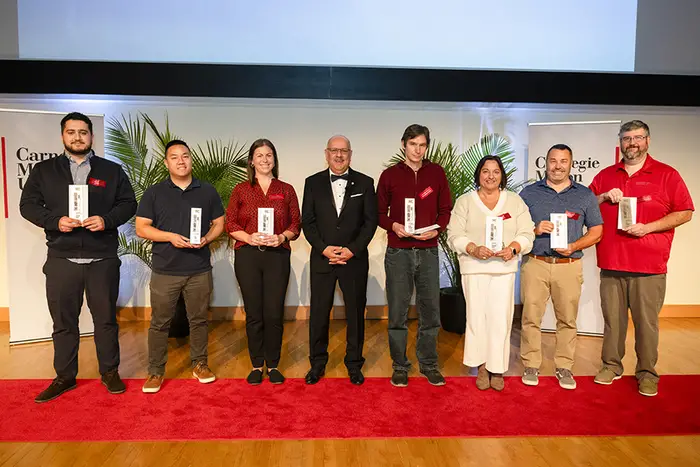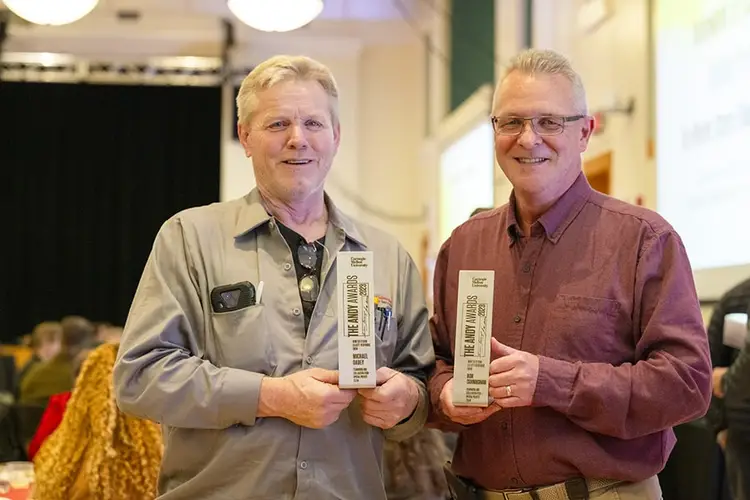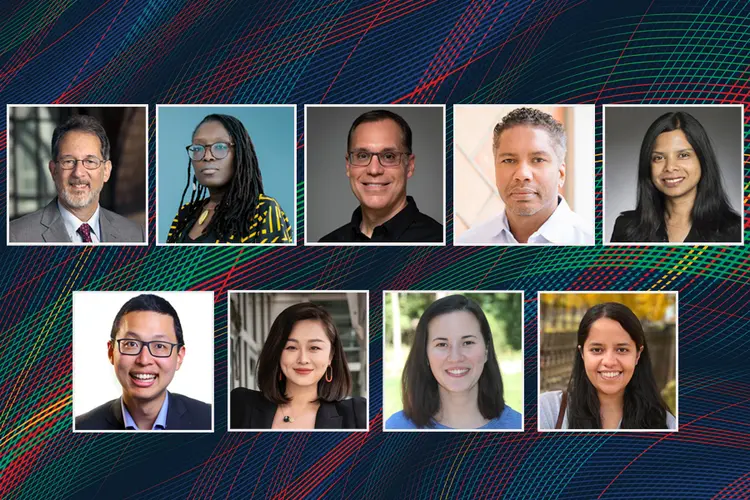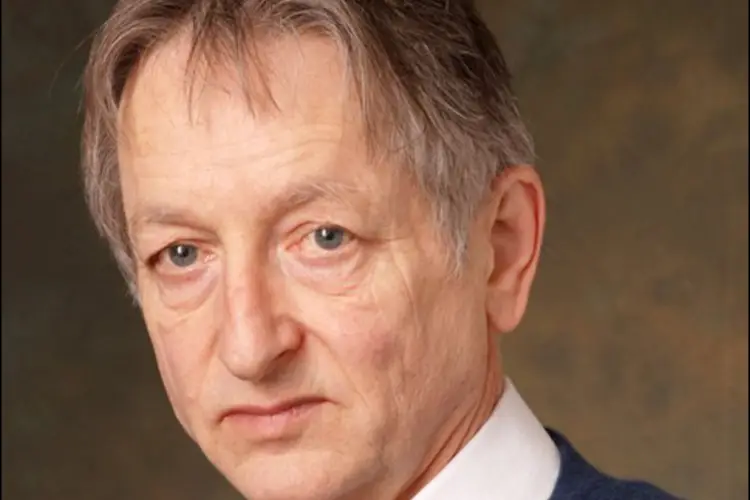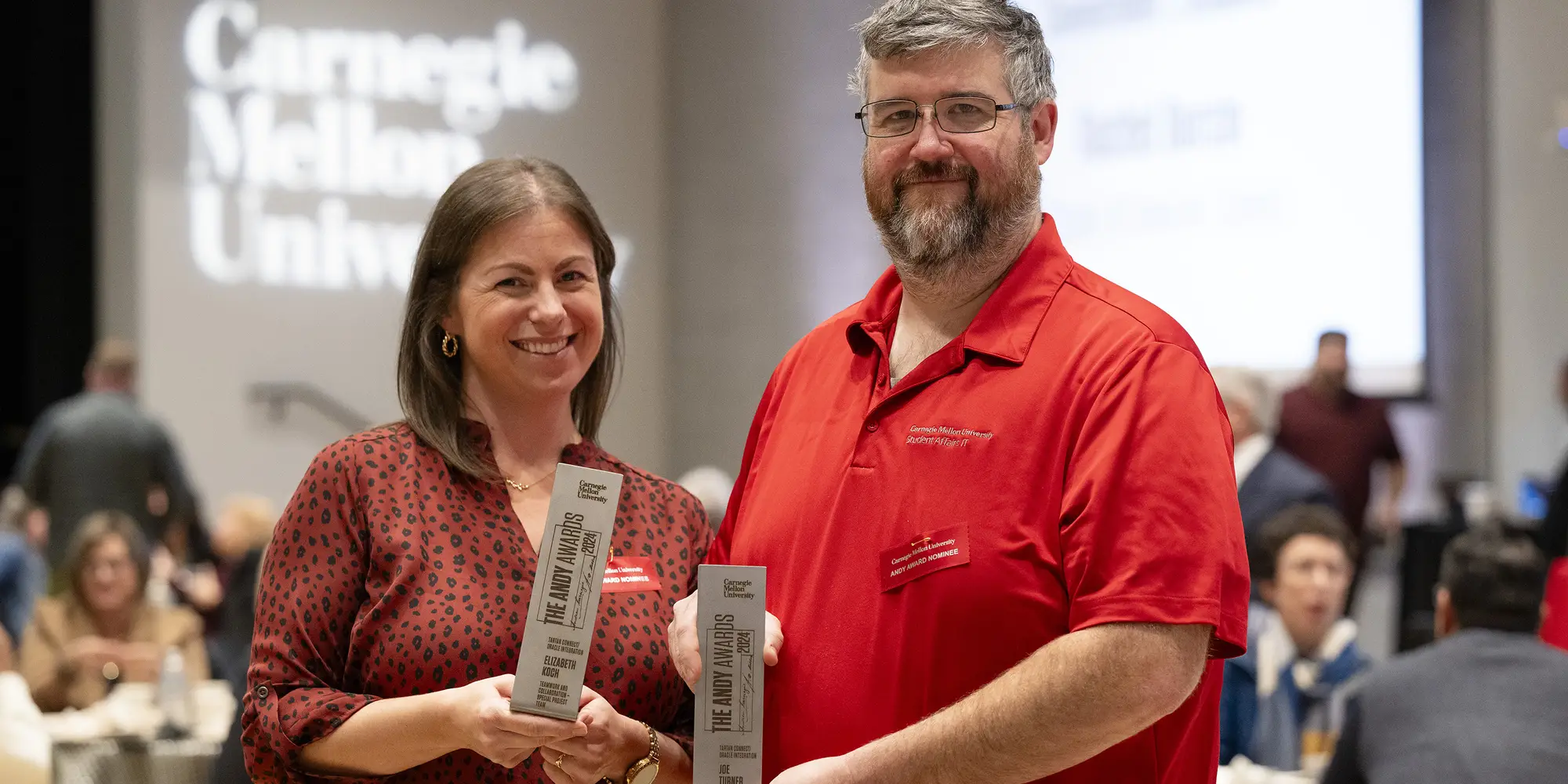
Andy Awards Highlight CMU Staff for Exceptional Contributions
Media Inquiries
Six staff members and two teams were recognized for their meaningful contributions at Carnegie Mellon University’s 30th Annual Andy Awards(opens in new window) ceremony, held Tuesday, Oct. 15, in McConomy Auditorium. In addition, Staff Council recognized individuals celebrating 30, 35, 40, 45 and 50 years of service to the university with Staff Service Awards(opens in new window).
The Andy Awards, named for Andrew Carnegie and Andrew Mellon(opens in new window), recognize the legacy that CMU staff members forge through their hard work. Individual staff members and teams of colleagues whose work has had a significant impact on the university are recognized in six categories: Commitment to Excellence; Commitment to Diversity, Equity and Inclusion; Commitment to Students; Innovative and Creative Contributions; Spirit; and Teamwork and Collaboration.
This year’s nominees(opens in new window) included 59 individuals and 12 teams representing a diverse array of departments, functions and responsibilities across the university. The 2024 Andy Award winners are:
- Mark Villasenor, Commitment to Excellence — Rookie*
- Francisco Molina, Commitment to Excellence — Veteran**
- Jessica Tomko, Commitment to Diversity, Equity & Inclusion
- Rachel Burcin, Commitment to Students
- Kelli Maxwell, Innovative & Creative Contributions
- Quinten Brown, Spirit
- EcoCampus Staff, Teamwork and Collaboration — Standing Team
- Tartan Connect/Oracle Integration Team, Teamwork and Collaboration — Special Projects
*recognizes staff who have been at CMU for less than three years
**recognizes staff who have been at CMU for more than three years
Commitment to Excellence - Rookie
Mark Villasenor
Police Sergeant, University Police
In just three years with the University Police, “Sergeant Mark” Villasenor has become one of the most recognized people on campus. As the leader of the CMUPD Community Resources Unit, he has spearheaded a number of successful initiatives that have built trust and relationships between the police and CMU’s diverse community through greater accessibility and transparency.
Villasenor’s commitment to safety led to the 2023 launch of the CMU Citizens Police Academy, a six-week, hands-on course that educates community members on the fundamentals of police work and provides insight into the day-to-day experience of CMUPD officers. He also revamped the department’s self-defense offerings to be more accessible, launching the Scotty Strong Self-Defense Program in 2024. These convenient two-hour classes empower participants with knowledge and practical physical strategies to protect themselves in any situation. Most recently, he secured a $29,000 grant from the Pennsylvania Liquor Control Board to fund alcohol education programs aimed at reducing underage and dangerous drinking.
In an effort to foster community engagement, this fall Villasenor organized Scotty’s Sizzle, a hot dog cookout that fed more than 800 people in three hours and allowed community members to get to know CMUPD officers in a relaxed, informal setting. He also coordinated a Beeler Street Meet and Greet to build neighborly relationships between long-term residents, students and the broader CMU community. He has worked to establish and improve relations with the University of Pittsburgh and other external entities in the city as well.
“His initiatives have not only enhanced safety but also strengthened the sense of community,” said Kari Carbone, senior development associate for the Center for Business Engagement. “His efforts have created a more cohesive and engaged campus environment, embodying the university’s values and significantly benefiting all members of the CMU community,”
Villasenor’s commitment to the community is evident in his generous participation in service initiatives on and off campus. He helped to pack food at CMU’s Rise Against Hunger event last February, actively engaging with students as he worked alongside them. As a committee member for Special Olympics Pennsylvania, he helps to organize fundraisers such as the Polar Plunge, the Law Enforcement Torch Run and the CMU Carnival event, Douse-A-Dean.
After leading the CMUPD’s participation in Staff Council initiatives such as Take Our Children to Work Day, Kennywood Day and the Food Drive, he was elected as an at-large representative for 2023-2025.
“Mark consistently shows exceptional dedication to the CMU community, going above and beyond the responsibilities of his job,” said Ryan Kuehn, assistant director of business engagement.
Beyond his experience and knowledge, Villasenor is known for his kindness and friendliness, always quick with a smile and an encouraging word.
“What makes him worthy of the award beyond accomplishment is his dedication, attitude, vocation of service, and care and compassion for our students, staff, faculty, families and community at large,” said Francisco Molina, senior director of disaster recovery and business continuity.
Commitment to Excellence - Veteran
Francisco Molina
Senior Director, Disaster Recovery/Business Continuity Services, Enterprise Risk Management
As senior director of disaster recovery and business continuity, and now interim chief risk officer, Francisco Molina demonstrates unwavering commitment and dedication to ensuring CMU’s resilience, whether it’s emergency preparedness and response, business continuity or disaster recovery for information technology (IT).
Over the past year, Molina led and coordinated two large-scale, half-day exercises in collaboration with University Police, simulating an active shooter situation and the police’s tactical response. The exercises also were used to practice the activation of the Emergency Preparedness and Response Team (EPRT) and crisis communications mobilization. The second exercise, held in Hunt Library, included police from the University of Pittsburgh and involved a building evacuation with victims played by staff actors. It was observed by the Red Cross, University of Pittsburgh Emergency Management, City of Pittsburgh Emergency Management and Blue Moon Consulting Group — the university’s crisis communications consultants.
“As one can imagine, these exercises require a tremendous amount of planning, coordination and communication to ensure that everyone understands roles, responsibilities and the objectives of the exercises,” said Melanie Lucht, former chief risk officer. “Multiple challenges needed to be overcome to ensure a successful result.”
Molina also coordinated a comprehensive half-day tabletop exercise focused on disaster recovery for IT, simulating the loss of CMU’s data center. The exercise was no ordinary drill; it was an intricate scenario that challenged teams to model their response using only the resources available at the designated disaster recovery location.
Molina’s meticulous planning and collaborative approach was instrumental in the success of the exercise. He worked closely with multiple groups, helping to review their disaster recovery plans, identify gaps and bridge groups to work together to address them.
“Franciso’s professionalism, patience and attention to detail fostered a sense of unity among our staff, reinforcing our commitment to excellence,” said Deputy Chief Information Officer David Baisley.
Coincidentally, only two weeks after the exercise, the data center experienced a power outage during scheduled maintenance. By following the recovery sequence practiced in the exercise, teams were able to restore impacted technology services in less than four hours, surpassing recovery time objectives.
“The exercise we had so carefully planned for under Francisco’s direction was now a reality,” said Baisley. “The tools and techniques developed during our planning proved invaluable during this real-world crisis. Francisco’s tireless efforts helping us to prepare saved the day.”
Chuck Carney, senior director of reputation and issues management, said Molina has been an invaluable partner in planning for and responding to a myriad of different challenges. “Francisco is helping to lead Carnegie Mellon forward by being one of the best we have at pulling together the disparate parts and personalities within the institution for a role that requires such in particularly difficult circumstances.”
Commitment to Diversity Equity & Inclusion
Jessica Tomko
Assistant Director of Admissions, Electrical and Computer Engineering, College of Engineering
As the co-chair of the Diversity, Equity and Inclusion (DEI) Committee for the Department of Electrical and Computer Engineering (ECE) since 2020, Jessica Tomko has put her advocacy, knowledge and passion to work creating a welcoming environment for all members of the ECE community.
Tomko leads a committee of approximately 20 faculty, staff and students in their efforts to foster a more inclusive and diverse departmental culture. She single-handedly manages all of the administrative work of the committee and communicates diversity-related events, opportunities, trainings and messages with the community. This work is entirely voluntary and extends beyond her regular job duties in admissions, where she is responsible for more than 5,000 applicants to ECE graduate programs.
Under Tomko’s leadership, the DEI Committee has successfully launched multiple initiatives, including the ECE Diversity Awards, Peer Mentors Program and Food with Friends events. She also facilitated a town hall, created a departmental climate feedback form, spoke at Sophomore Seminar about DEI issues and unconscious bias, wrote a Black Lives Matter statement and resource list, and planned faculty training opportunities.
In addition, Tomko expanded the committee to include student representatives to increase transparency and ensure the needs of students were being met.
“These initiatives have not only enhanced a sense of belonging within our department but also contributed to a more inclusive and supportive environment,” said academic adviser Holly Skovira. “Whether it is making sure an event is an accessible space, or that our orientation materials have captions, or that we update our admissions language to include pronouns, Jessica is always looking for ways to be inclusive and make CMU a better place for all.”
Tomko is involved in advancing DEI at the college and university levels as well through her involvement on the College of Engineering Diversity Committee and with the Diversity and Inclusion Network, respectively. By getting involved on multiple levels, she seeks to reduce what is often a siloed approach at CMU, and to increase her own understanding of existing resources and opportunities. She is dedicated to continuously educating herself on current issues and best practice so she can improve her service to the community.
Sharing knowledge is another key facet of her work, since creating meaningful change in a community isn’t a solo effort. Tomko works hard to ensure that her colleagues are also best set up to continually enhance their DEI efforts.
“Jessica’s service leadership has been integral in fostering spaces where committee members feel empowered, motivated and inspired to make a lasting impact on the student, staff and faculty experience,” said fellow DEI committee member Brittany Bristol. “Jessica does not let the ‘whatabouts’ or anything else become a barrier; she focuses on access for all, and her leadership inspires and encourages us all to always find hope."
Commitment to Students
Rachel Burcin
Global Programs Manager, Robotics Institute
As co-director of the Robotics Institute Summer Scholars (RISS) program, Rachel Burcin has been highly successful in providing undergraduate students with opportunities for research and graduate education. Since its founding in 2006, she has been instrumental in establishing and strengthening the RISS program in the areas of funding, research opportunities, professional development, diversity, communications and community.
But Burcin is best known for her exceptional dedication and commitment to her RISS students, many of whom come from underrepresented backgrounds. She works tirelessly counseling, mentoring and supporting these students, ensuring their scholarships are in place, assisting with graduate applications and performing countless other tasks to ensure their success. She also fosters an inclusive community where every student feels like they belong.
Micah Nye, a first-generation student in the RISS program, said Burcin provided invaluable support and guidance during his graduate application process, identifying fellowship opportunities, writing and requesting letters of recommendation, and reviewing his essays. More importantly, she served as a friend and listening ear during a time of great anxiety.
“I can proudly say she transformed my life, as I now enter my master's in robotics as an inaugural CMU Rales Fellow. I would never have even dreamt about this possibility, had it not been for Rachel and her commitment to her students like me,” said Nye. “Rachel is widely considered one of the most kind and down-to-earth individuals at the RI and CMU; she is a true gem.”
In keeping with her passion for providing robotics education to underserved communities, Burcin partnered with professor Max Likhachev and the Pennsylvania Rural Robotics Initiative to create “The Robot Doctor,(opens in new window)” an Emmy Award-winning series of robotics lessons for high school students. She is a lead member of the team that developed the RoboticsEd website, which promotes accessible STEM education for K-12 students. She also helped the rural town of Franklin, Pa., secure a grant for a community center that provides STEM and robotics education and resources for kids.
Ph.D. student Willa Potosnak said pursuing a doctoral degree, particularly in robotics, was not something she ever envisioned prior to RISS, which she describes as a pivotal life experience. She credits Burcin for the program’s success and the opportunities it provides.
“I look to Rachel as a role model not only for her hard work and dedication to helping others learn and grow but also for her never wavering kindness and high-spirited attitude that she applies in all endeavors,” said Potosnak.
“Rachel’s consistently cheerful demeanor and unflagging persistence in seeking the best outcomes for students inspire great affection and loyalty,” said John M. Dolan, principal systems scientist at the Robotics Institute. “The result is a group of hundreds of RISS alumni at CMU, throughout the U.S., and on several other continents who love and honor her for her impact on, and in many cases, continuing involvement in their lives.”
Innovative & Creative Contributions
Kelli Maxwell
Associate Dean for Student Success, Dietrich College of Humanities and Social Sciences
In just two years as the associate dean for student success, Kelli Maxwell has led a transformation in the way Dietrich College approaches and supports its students.
Innovation and creativity lie at the core of her work. She has reimagined processes to more equitably support students, built new programs to celebrate students from historically underrepresented groups, hired new roles to more strategically and effectively lead programs, and collaborated with campus partners to create consistency and transparency among processes.
“She has transformed the Office of Student Success in a number of ways, and it is now dramatically more organizationally effective,” said Richard Scheines, the Bess Family Dean of Dietrich College.
One of her most significant contributions was developing a more holistic and intentional support process for students moving back into good academic standing, changing terminology with punitive connotation (such as “probation”) and implementing interventions that challenge students to engage in self-reflection, set goals with their advisers and connect with support on campus.
She worked with Dietrich Computing Services to create new student success dashboards to track and compare data across student groups, enabling the College to more effectively determine the impact of its programs and intervene earlier when a student needs help.
Another notable contribution was defining and publishing transparent internal transfer criteria for Dietrich College, which has 37 majors and 10 departments. Previously this criteria was not publicly available, making it difficult for some students to navigate the process without finding the appropriate adviser. Viewing this as an equity issue, Maxwell moved quickly to resolve it.
In response to long-time student concerns about feeling “lost in a sea of STEM,” Maxwell created a position for a dedicated academic adviser for humanities, then worked with the new adviser to establish The Humanities Commons, a physical space offering social, academic and professional development programming.
Maxwell spearheaded the development of the VOICES program, which celebrates and fosters community among students, faculty and staff, particularly those from first-generation, low-income and other underrepresented backgrounds. She hired a dedicated staff member, Ashley Christopherson, who specializes in advising and programming for first-generation students.
“Kelli is a constant encourager of creativity in building spaces, systems, and programming to better support our students and foster belonging among the entire community,” Christopherson said.
Recognizing the value of providing students with opportunities to extend what they learn in the classroom to relevant, real-world experiences, Maxwell worked with the director of experiential learning to grow the Pittsburgh Summer Internship Program, launch a Community Engagement Fellowship program, and successfully propose making experiential learning a graduation requirement.
Maxwell encourages her colleagues to re-envision and innovate how they might better serve students. This led to the successful pilot of the first-year Dietrich seminar DISCUSS, which is taught by advisers and teaches students “how to college.”
“Kelli and her team have advanced our efforts to build a culture where students feel like they belong, are valued and supported — from the time they enroll through their graduation and beyond,” said Abby Simmons, associate dean of communications for Dietrich College.
Spirit
Quinten Brown
Executive Administrator and Manager of Administrative Operations, Office of the Provost
Quinten Brown exemplifies spirit in every sense of the word. A champion for CMU’s administrative staff and steadfast advocate of growth mindset, he is a valued community member who fosters a more inclusive, welcoming and collaborative workplace. With great intention and care, he signals that CMU is a place where everyone is invited to engage and belong.
Since joining the Office of the Provost in 2017, Brown has consistently demonstrated enthusiasm, curiosity and an openness to learn. He is on the front line interacting with faculty, students, staff, administrative leaders and external partners every day, working to further the priorities of the provost and mission of the university.
“He is a true partner to the provost and me in continually improving operational efficiencies, maximizing time and fostering positive relationships inside and outside of CMU,” said Becky Culyba, vice provost for strategic initiatives and chief of staff. “I am truly proud to see the highly visible leader he has become at CMU.”
Brown exemplifies a commitment to learning, growth and excellence. He is a graduate of the Emerging Leaders Program in The Advanced Leadership Institute at the Tepper School of Business, where he learned the skills of effective leadership. His passion for learning and development has made him a role model, inspiring his colleagues to pursue their own growth. He then cheers them on, lifts them up and pushes them toward excellence.
“I have watched Quinten listen to feedback, embark on his own journey of self exploration, then launch himself into using new ideas to support the provost and CMU,” said Autumn Riddle, executive assistant in the College of Engineering Dean’s Office. “I've watched as he's coached me, my teammates and the admin in his office towards a growth mindset versus a fixed mindset, challenging others to believe in their abilities and themselves while seeking opportunities to change and grow.”
Brown is also an enthusiastic mentor to CMU students. In the early years of the Tartan Scholars program he mentored a younger member of the leadership team, and he currently mentors a first-year scholar. He serves in an advisory role to the Ambitions Closet, which provides professional clothing to students who may not otherwise have access, helping young people show up in the workplace more confidently. At events, he proactively seeks out students who may be standing apart from others and initiates conversations, making them feel seen and welcomed.
“When we talk about Carnegie Mellon being a relational place, these are the quiet ways that contribute to people feeling the sense of care we hope is baked into our community,” said Renée Camerlengo, executive director of the Student Academic Success Center. “Quinten is the guy in the room, sharply dressed, taking it in and finding people who need to be found and seeing them. We would all be better community members if we can do a bit more of this more often.”
Teamwork and Collaboration — Standing Team
EcoCampus Staff, CMU-Qatar
Elissar El-Akra Hajjar, Rosemarie Florida, Stephen Heath, Angela Ng
The EcoCampus staff at Carnegie Mellon University in Qatar is a dedicated team of volunteers who work tirelessly to promote sustainability on campus through innovative and impactful projects. The team’s shared commitment to environmental, social and economic responsibility has made a significant and recognizable difference in the CMU-Q community.
“They have fundamentally shifted CMU-Q’s identity toward sustainability,” said Jennifer Bruder, associate dean for research and associate teaching professor of psychology. “They have impacted university operations significantly for the better.”
One of their most impactful achievements has been the implementation of policy changes that improve efficiency and productivity while reducing CMU-Q’s environmental footprint. These include reducing single-use plastics, managing waste more effectively, installing energy-efficient lighting, utilizing green procurement practices, creating guidelines for green events and establishing a carbon offsetting program for university travel.
Their "Passport for Sustainability" initiative, which encourages students to participate and keep track of their eco-friendly activities, fosters a sense of unity and shared responsibility.
The EcoCampus team also organized a variety of educational events and activities, such as visits to sustainable farms, recycling and composting workshops, and even a kayaking trip to promote a better understanding of Qatar’s ecosystem.
“Their efforts have created an environment that promotes communication, trust, cooperation and respect for differences amongst our diverse community,” said Simon Faulkner, assistant teaching professor of chemistry. “Together, they are shaping our application to become the first university in the Middle East to achieve the FEE Ecocampus Green Flag award.”
The EcoCampus team's efforts are not limited to environmental sustainability. They have extended their commitment to social responsibility by supporting CMU-Q’s service workers, providing them with meal cards, hosting a community bazaar and organizing the Language Bridges program to teach them English and computing skills.
Through their Wellness Wednesday initiative, the team hosted a series of Qigong sessions, where students, faculty and staff had the opportunity to engage in mindfulness and stress-reduction techniques.
This holistic approach showcases the team's ability to address multiple aspects of sustainability and create a more inclusive and supportive campus environment.
In April 2024, the team attended the 1st International Conference of FEE EcoCampus in Lisbon, which provided an invaluable platform to showcase the sustainability initiatives and activities taking place at CMU-Q. The team's presentations sparked meaningful conversations, opening up new opportunities to collaborate with international organizations.
As a culmination of their ongoing efforts, the team was instrumental in drafting a Sustainability Charter for the CMU-Q campus, which Dean Michael Trick signed on Earth Day in April 2024.
“By establishing a comprehensive framework for sustainability, the EcoCampus team has laid the foundation for a greener, more responsible future for our university community,” said Reya Saliba, instruction and outreach librarian at CMU-Q. “This achievement not only showcases the team's exceptional dedication and leadership but also sets a powerful example for other institutions to follow.”
Teamwork and Collaboration - Special Projects
Tartan Connect/Oracle Integration
Margaret Carter, Elizabeth Koch, David Schreib, Adrian Stan, Eric Tran, Joe Turner, Jeff White, Casey Way
Student Affairs has long fielded a simple question from Student Government leaders: Why can’t our 350 student organizations see the live balances in their financial accounts? It was a reasonable question that belied a significant problem — one that was solved by the dedicated work of eight staff members spanning Student Affairs IT and Finance, SLICE and the Business Applications Development and Support team (BADS) in the Finance Division.
The previous system required SLICE and Student Affairs Finance to manually download, manipulate and re-upload massive amounts of financial data from Oracle Financials into the student engagement platform, an error-prone and labor-intensive process. This system caused significant delays and inaccuracies, making it difficult for organizations to manage their budgets and reconcile their accounts effectively.
In July 2022, the decision was made to transition to TartanConnect, a platform with more advanced integration capabilities. The transition marked the beginning of a complex, yearlong project characterized by numerous challenges and setbacks.
“The journey was fraught with difficulties, including data discrepancies during month-end processes, incomplete vendor documentation and support, and technical hurdles in API implementation,” said Alfredo Lozano, director of IT for Student Affairs. “However, the team’s relentless pursuit of excellence and their unwavering commitment to improving the student experience drove them to overcome these obstacles.”
By November 2023, after countless rounds of testing and comparison, a fully live API integration allowed financial data to be transferred nightly. The impact was immediate and profound. More than 15,000 transactions have been seamlessly loaded into TartanConnect since the launch, encompassing activity fees, donations, sponsorships and expense reimbursements. The work hours needed to manually manipulate data has been virtually eliminated, and $3-5 million of student organization funds can be seen, managed and reconciled every single day.
“It is now much easier for an organization to stay fiscally responsible by being able to view their balances in a timely and accurate manner. This thus helps set up organizations to be financially successful in the future,” said Elizabeth Fu, a member of the Student Government’s Joint Funding Committee. “Without a doubt, the joint effort of this team to make the TartanConnect/Oracle project possible has improved the quality and efficiency in student organization financial data.”
“This team was unique from the beginning, with differing timelines, work styles and divisional goals. But they were all deeply connected by their shared belief that the current process was not a positive experience for the student end user and that the technology that we had available could not only solve the problem, but it should be the standard to ensure financial data accuracy,” said Liz Vaughan, director of SLICE. “This team is an excellent demonstration of the collaboration that is possible across departments and divisions, and how important it is to iterate, brainstorm and think together to solve complicated problems.”
